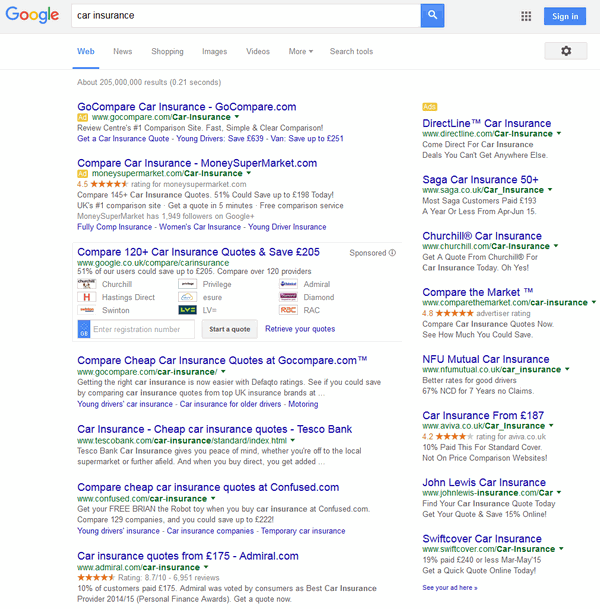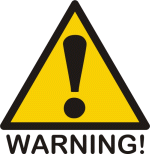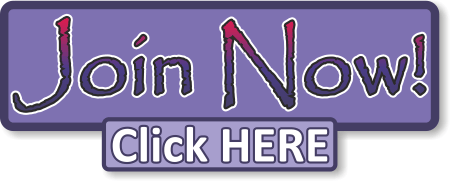What Is SEO?
SEO is an acronym for 'Search Engine Optimisation'. It's essentially a constantly evolving study of what factors the search engines take into account when they 'rank' you in their natural search listings.
 'Natural/Organic' search listings are the main lists of results that come up when you search for something. These do not include the PPC (Pay Per Click) listings.
'Natural/Organic' search listings are the main lists of results that come up when you search for something. These do not include the PPC (Pay Per Click) listings.
In this screen-grab from a Google search you can see the paid listings in the right column and the 3-block at the top. These used to have a yellow background to more readily highlight the difference, but Google now wants the paid listings to look more like the natural listings, to create more clicks!
These listings are straight from Google's main index and show sites listed in the order of importance and relevance according to their algorithm.
Obviously, we want to be as high up the page(s) as possible. If we're the 7th listing on page 23 - we're hardly going to get prospects beating our door down!
No-one knows all the factors that Search Engines (SE's) use to determine your rank. The SE's really don't want anyone to know - so you can't manipulate the system. So, over the years an industry has grown up around this - using empirical testing and measuring of various factors to determine which ones are the most important.
There are two sides to SEO: 'On-Page' factors & 'Off-Page' factors. There are also 'off-web' factors such as demographic and geographic information - but we have no control over this area.
'On-Page' SEO
On-Page SEO is all about changes you can make directly to a site to make it more search engine 'friendly'. This is the easiest part and involves correctly setting up internal-linking, site structure, title & header tags, seeding mixed keywords in appropriate places (and at an appropriately low density - which should be under 2- 3%,) content quality/theming, and to some lesser degree, site load-times etc. If all that is complete double-dutch to you, then don't worry - you're not alone! There are numerous E-Books & Forums which explain the principles of 'on-page' SEO in some depth.
The bottom-line though, is that while it is the easiest to control, it has the LEAST affect on your ranking for most sites. Many years ago, you used to be able to dupe the Search Engines with lots of on-page factors - but those 'tricks' have been completely closed down now.
Content quality, theming and 'mass' (how much content over how many pages) are considerably more important than they ever were. Without a volume of fresh, quality content, you'll find it hard to rank for anything.
The time that 'on-page' becomes important is when you have taken care of 'off-page' and have a bunch of inbound links to create some authority. At that point, careful tweaking of on-page factors (and in particular, internal linking) can yield some good results.
'Off-Page' SEO
Off-Page SEO is what's important for the vast majority of sites. Google likes 'authority', and this comes from plenty of well-written content with links from other authority sites to endorse it. Imagine it as a voting system. If another site places a link to your site, then that site has given you a vote of confidence. They're saying, "Look at them - they've got something interesting to say..."
 The link to your site has two main parts - the actual URL or web address of the page they are pointing someone to, and the 'anchor text' or 'keyword phrase' that is highlighted for you to click. If the search engines see the line:
The link to your site has two main parts - the actual URL or web address of the page they are pointing someone to, and the 'anchor text' or 'keyword phrase' that is highlighted for you to click. If the search engines see the line:
"Visit our site for the very best in blue fluffy widgets."
...then they see one 'vote' cast. Although you can't see what the link points to (unless you hover over it with your mouse pointer - then it should show at the bottom of your browser window), you can see that the text 'blue fluffy widgets' is clearly important - because that is the anchor text.
So... We now have a vote for that linked web page based on the 'blue fluffy widgets' phrase.
i.e. one vote towards this site appearing higher in the natural listings when we type "blue fluffy widgets" into the search box.
This always works like this - the anchor text and page pointed to are irrevocably tied together. You can't create a vote for a page without some highlighted anchor text (and let's not get into image-linking right now - we're trying to explain the concept,) and that anchor text is part of what the SE's use to tell them what that page is about and what it should show up under when searched for.
The Anchor Text Helps Controls Which Searches You Would Appear For
Therefore, to continue with the previous example, if the line was, "Visit our site for the best in blue fluffy widgets" then you'd just have created a vote for 'Visit our site', rather than 'blue fluffy widgets'. Can you see the problem?
There is an often quoted classic example of this, and that's the "Click HERE for more information..." phrase.
In this example, we've created a vote for the phrase 'Click HERE'. Who in their right mind would type in "click here" in the search box to find a site? No-one of course. That is why the anchor text is SO important. It signifies the keyword phrases that you want to rank for. (And by the way, if you DO Google "Click Here", you will generally find the Adobe Reader download site at the top. Is that because Adobe want to rank for 'click here' - of course not - it's just that so many sites have a 'click here to download Adobe Reader' phrase on them, that they're number one for that phrase.)
In other words, the SE's use the anchor text phrase to help cast a vote for a page. And doesn't that make sense? Google wants to emulate what a real human being is looking for and would like to find.
 In a lot of ways it doesn't matter if your page is all about blue fluffy widgets, if all the anchor text phrases that point to you say 'yellow balloons', then 'yellow balloons' is what you'll end up ranking for! That is the vote that is cast.
In a lot of ways it doesn't matter if your page is all about blue fluffy widgets, if all the anchor text phrases that point to you say 'yellow balloons', then 'yellow balloons' is what you'll end up ranking for! That is the vote that is cast.
Now it's not as simple as that (of course...) because the SE's also use the page title and surrounding content of the page being pointed at to correlate and refine the results, as well as the surrounding content from your page, the overall content theme of each site, plus a whole bunch of other factors as well (including how physically spread-out the sites are that are linking to you). But the essence of this shows that the most important factor in SEO is a range of back-links from as many different sites as possible with the correct phrases used as anchor text.
However; we need to avoid what we call 'over-optimisation' - and have massive variety in these phrases, as well as a lot of other brand and generic phrases to keep it looking natural and unmanipulated - but that will be discussed later. For now, let's keep it simple.
Ideally, if you want to appear in the natural SE listings for 'blue fluffy widgets' then you want a page that has 'blue fluffy widgets' in its title, and it should also be mentioned in the text on that page. Then you want lots of external site links that point to that specific page with the anchor text containing 'blue fluffy widgets'! (Again, we need to avoid over-optimisation here.)
But... Enough with the 'blue fluffy widgets' now: You get the idea... Picking the keyword phrases that you want to rate for can be an art in itself, but people get too hung up on this. The bottom line is: What does a typical customer of yours type in the search box in order to find your product or service? ...The answers to this question supply the basis of your anchor text keywords!
Obviously, we need to do 'keyword research' to ensure people are actually using the phrases we've chosen and that there are sufficient numbers of searchers to make it commercially worthwhile pursuing that keyword phrase. We're looking for a balance actually; enough people searching that phrase, but not so many as to make it overly difficult to rank for. Which brings us on to...
Some Important Words Of Caution...
 Do Not Use Phrases That Yield Millions & Millions Of Results
Do Not Use Phrases That Yield Millions & Millions Of Results
In the screen shot at the top of the page, you'll see a UK search for 'Car insurance' - which has 205 million results. I don't know about you, but I don't want to try and compete with 205 million other pages when I'm just starting out! Especially when those sites are major corporates with huge marketing budgets.
But... If I typed in "Southampton car insurance" (assuming I was a car insurance provider in Southampton) - then there are around 1,150,000 results. A big number still - but a lot more reasonable number when it comes to web searches.
I would have a far better chance of getting ranked for that phrase in a reasonable time-scale than I would for just 'car insurance'. In fact, if I wanted to rate for phrases like 'Car Insurance' it would probably take years and some seriously deep pockets, as I would be competing with the insurance giants - not a wise choice at all!
Therefore, we're looking for phrases that yield less overall results - but quite accurately sum up what we do or the product/service we offer. In the industry, we often call these 'long-tail' searches - they contain multiple keywords and return less competitive results than primary keyword searches. Depending on how competitive your market is, the phrases could be from 2 to 7 words long. Typically they will be 3 or 4 words long. But, the term 'long tail' has nothing really to do with the length of the keyword phrase; it relates purely to it's search competitiveness. We often call these terms the 'low hanging fruit'; the easier ones to reach.
We normally recommend performing SEO on phrases that return no more than 100,000 to 1 million results at the start. And we should also be doing in-depth research on the 1st page of Google results for this search - to ensure that we're not competing with pages that are going to be impossible to out-rank (like 'car insurance' for example!) We look at factors like page 'authority', site age and size, the number of back-links built to that specific page and the entire site, on-page keyword optimisation for your phrase, and the list goes on.... There are plenty of sites that will teach you the rudimentaries of keyword and market analysis. Check out Market Samurai and The Challenge for good background information.
Then, as we build back-links, we will automatically start to gain some ground on the bigger search phrases, and if we put in enough effort, we can go after those big phrases in 6-12 months. But often, the 'bigger' phrases are not particularly focused, because...
We're Also Looking For Phrases That Demonstrate 'Commercial Intent'
We don't usually want search phrases that are purely for research or information gathering purposes. 'Commercial Intent' means they're phrases that indicate someone is looking to make a purchase or request further information.
If you compare the searches: "golf clubs" and "buy wilson golf clubs in southampton", you can clearly see that the first will be much harder to rank for, has multiple meanings ('clubs' could mean the place where you play - as well as what you whack the ball with!) and is probably more research oriented. The second phrase is clearly someone looking to purchase locally and will be much easier to rank for.
Hopefully, this example will get your mental gears turning!
...That covers basic theory: Now CLICK HERE To Move Onto SEO Techniques & Application
Only $67 per monthUp to 1200 new contextual links 1,000 comment & 1,000 profile links |


